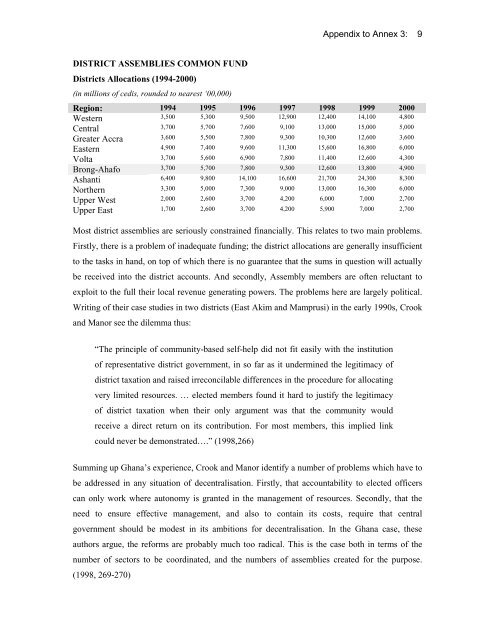Poverty Dimensions of Public Governance and Forest Management ...
Poverty Dimensions of Public Governance and Forest Management ...
Poverty Dimensions of Public Governance and Forest Management ...
You also want an ePaper? Increase the reach of your titles
YUMPU automatically turns print PDFs into web optimized ePapers that Google loves.
Appendix to Annex 3: 9<br />
DISTRICT ASSEMBLIES COMMON FUND<br />
Districts Allocations (1994-2000)<br />
(in millions <strong>of</strong> cedis, rounded to nearest ‘00,000)<br />
Region: 1994 1995 1996 1997 1998 1999 2000<br />
Western 3,500 5,300 9,500 12,900 12,400 14,100 4,800<br />
Central 3,700 5,700 7,600 9,100 13,000 15,000 5,000<br />
Greater Accra 3,600 5,500 7,800 9,300 10,300 12,600 3,600<br />
Eastern 4,900 7,400 9,600 11,300 15,600 16,800 6,000<br />
Volta 3,700 5,600 6,900 7,800 11,400 12,600 4,300<br />
Brong-Ahafo 3,700 5,700 7,800 9,300 12,600 13,800 4,900<br />
Ashanti 6,400 9,800 14,100 16,600 21,700 24,300 8,300<br />
Northern 3,300 5,000 7,300 9,000 13,000 16,300 6,000<br />
Upper West 2,000 2,600 3,700 4,200 6,000 7,000 2,700<br />
Upper East 1,700 2,600 3,700 4,200 5,900 7,000 2,700<br />
Most district assemblies are seriously constrained financially. This relates to two main problems.<br />
Firstly, there is a problem <strong>of</strong> inadequate funding; the district allocations are generally insufficient<br />
to the tasks in h<strong>and</strong>, on top <strong>of</strong> which there is no guarantee that the sums in question will actually<br />
be received into the district accounts. And secondly, Assembly members are <strong>of</strong>ten reluctant to<br />
exploit to the full their local revenue generating powers. The problems here are largely political.<br />
Writing <strong>of</strong> their case studies in two districts (East Akim <strong>and</strong> Mamprusi) in the early 1990s, Crook<br />
<strong>and</strong> Manor see the dilemma thus:<br />
“The principle <strong>of</strong> community-based self-help did not fit easily with the institution<br />
<strong>of</strong> representative district government, in so far as it undermined the legitimacy <strong>of</strong><br />
district taxation <strong>and</strong> raised irreconcilable differences in the procedure for allocating<br />
very limited resources. … elected members found it hard to justify the legitimacy<br />
<strong>of</strong> district taxation when their only argument was that the community would<br />
receive a direct return on its contribution. For most members, this implied link<br />
could never be demonstrated….” (1998,266)<br />
Summing up Ghana’s experience, Crook <strong>and</strong> Manor identify a number <strong>of</strong> problems which have to<br />
be addressed in any situation <strong>of</strong> decentralisation. Firstly, that accountability to elected <strong>of</strong>ficers<br />
can only work where autonomy is granted in the management <strong>of</strong> resources. Secondly, that the<br />
need to ensure effective management, <strong>and</strong> also to contain its costs, require that central<br />
government should be modest in its ambitions for decentralisation. In the Ghana case, these<br />
authors argue, the reforms are probably much too radical. This is the case both in terms <strong>of</strong> the<br />
number <strong>of</strong> sectors to be coordinated, <strong>and</strong> the numbers <strong>of</strong> assemblies created for the purpose.<br />
(1998, 269-270)
















